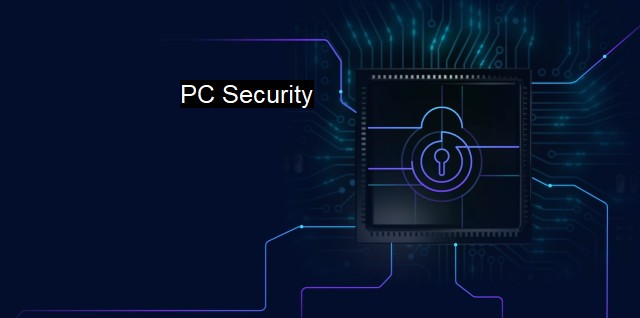What is PC Security?
Securing Your PC in a Cyber World: Importance, Measures, and Antivirus Software
PC security is of utmost importance. It refers to the measures taken to protect a computer system from unauthorized access, viruses, malware, ransomware attacks, phishing attempts, and other online threats.In a cyber world where cyber-attacks and malware attacks become more sophisticated every day, there is increasing awareness and concern about the need for robust PC security. Hackers are increasingly targeting businesses and individuals that are careless about their cyber security, and they do so with the aim of gaining access to sensitive information and data, which they can use for financial gain or other malicious activities.
At a basic level, PC security involves taking preventive measures to stop cyber-attacks before they take hold. This includes updating antivirus and anti-malware software regularly, installing operating systems with built-in security features, keeping software and operating systems up to date with the newest security patches, using strong passwords and multi-factor authentication, securing the Wi-Fi network, and avoiding clicking on suspicious-looking links, especially when they come from an unknown source.
One major aspect of PC security is antivirus software. Antivirus software is a program that is designed to prevent, detect, and remove viruses and malware from a computer system. These programs work by scanning the computer system for any suspicious code or data, comparing it to known virus signatures and patterns or heuristics, and if anything is found, the software will either remove the file or quarantine it until the system's administrator can check it manually.
Over the past few years, antivirus software has improved and evolved to handle new viruses that utilize more sophisticated techniques to spread malware and avoid detection. Today, many antivirus programs have artificial intelligence (AI) and machine learning (ML) algorithms to improve its detection capabilities.
A quality antivirus software should include different features like email scanning to give you protection against spam-based attacks; web filtering options allowing to keep your network connections secure and avoid phishing websites; file scanning which is essential to ensure that there are no malware, bundleware, or other potential infiltrators hiding in any of the software downloads you’ve installed on your device; Firewall, automatic updates, and data backup functionalities are among other features that may be included in today's antivirus software.
One of the crucial roles that PC security and antivirus defenders play is in keeping businesses protected. Businesses face many more threats than just an individual user, and thus their PC security must be up to date and robust to prevent a severe data breach or precedent to a larger-scale attack.
Businesses' cybersecurity is the protection of their data and systems, as well as networks from unauthorized access or changes. Typically, online attackers aim to exploit finance data for theft and ransom, proprietary information, trade secrets, or reputation manipulation. A breach can sometimes force companies and individuals to pay attention to secure their information effectively.
PC security and antivirus software become more important risks grow and evolve in ways non-security consumers do not understand adequately. Increasing the necessary media coverage, which brought media attention-motivated investments focusing on inventing the next generation of antivirus software programs, constantly evolving to beat hackers and protect computer systems month to month. Everyone should handle their PC security with extreme caution by implementing basic security measures on their machines and utilizing the latest antivirus software to avoid infection with new malicious codes or detect an ongoing malicious activity proactively. The system administrators responsible for companies’ PC security must invest rigorously to have new events as protection gaps appear, planned and supplemented so they protect business structures and data. Brave compliance regimes will keep security gaps at bay with the right combination of PC security policies and regular evaluations by qualified security specialists.

PC Security FAQs
What is PC security?
PC security is the practice of safeguarding your computer and its data from unauthorized access or damage. It involves using various security measures such as antivirus software, firewalls, and encryption to protect your system from cyberattacks.Why is PC security important?
PC security is important because cyberattacks can cause significant damage to your computer and compromise your sensitive information. Attackers can steal your personal and financial data, install malware, and use your computer to conduct illegal activities. A lack of PC security can put your entire digital life at risk.What is antivirus software?
Antivirus software is a type of security software that is designed to detect, prevent, and remove malware from your computer. It works by scanning your system for known viruses, malware, and other malicious software, and either quarantining or deleting them. Antivirus software is an important component of PC security and should be regularly updated to ensure maximum protection.What are some tips for improving PC security?
Some tips for improving PC security include using strong and unique passwords, keeping your software and operating system up-to-date, using antivirus software and firewalls, avoiding suspicious emails and downloads, and being careful about what personal information you share online. It's also important to regularly backup your data in case of a cyberattack. External Resources
| | A | | | B | | | C | | | D | | | E | | | F | | | G | | | H | | | I | | | J | | | K | | | L | | | M | |
| | N | | | O | | | P | | | Q | | | R | | | S | | | T | | | U | | | V | | | W | | | X | | | Y | | | Z | |
| | 1 | | | 2 | | | 3 | | | 4 | | | 7 | | | 8 | | |||||||